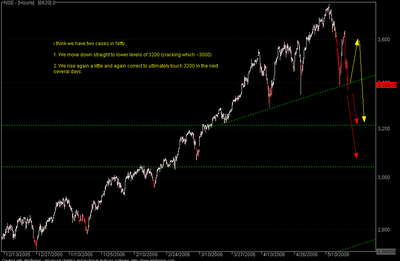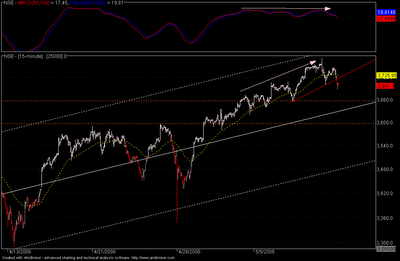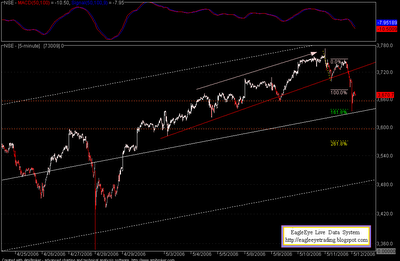>>WorldMarket-ShortTermCharts Visit<<<
>>World Market Long term Charts visit<<<

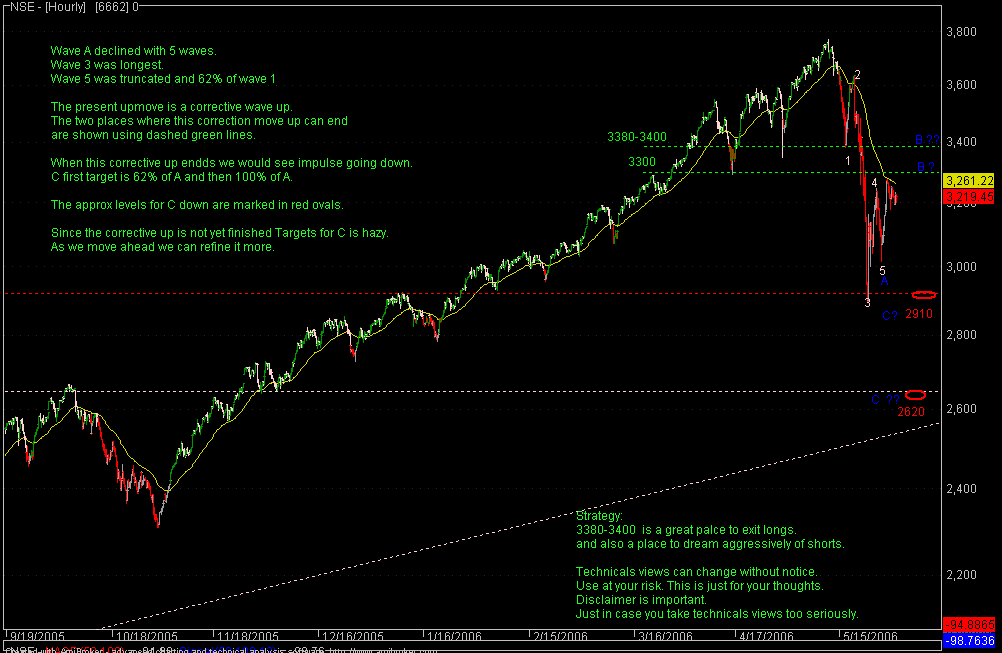
Do traders behave differently from gamblers? Research suggests not.
The best trades, I find, have enough of a historical edge to make me feel confident about the idea, but also enough potential downside to prevent me from feeling overconfident.
Planning for each trade being a potential loser may seem counterintuitive, but it keeps risk management sharp and overconfidence at bay. And that makes a world of difference to the bottom line.


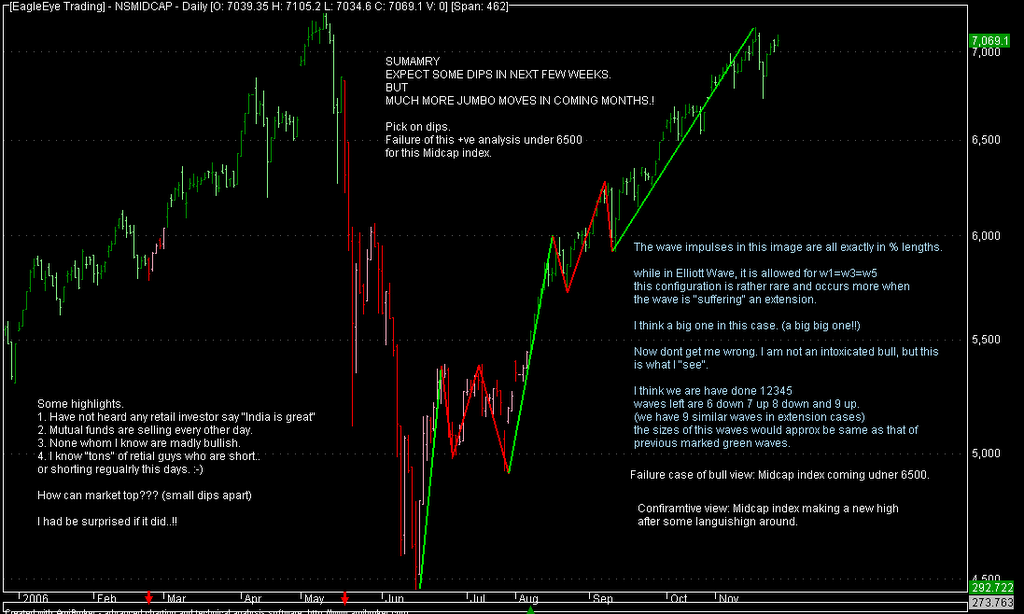
Always understand the risk/reward of the trade as it now stands, not as it existed when you put the position on. Some people say, "I was only playing with the market's money." That's the most ridiculous thing I ever heard. -Bill Lipschutz
You don't have to get in or out of a position all at once. Avoid the temptation of wanting to be completely right. -Jack Schwager
I basically learned that you must get out of your losses immediately. It's not merely a matter of how much you can afford to risk on a given trade, but you also have to consider how many potential future winners you might miss because of the effect of the larger loss on your mental attitude and trading size. -Randy McKay
I take the point of view that missing an important trade is a much more serious error than making a bad trade.- William Eckhardt
Large profits are even more insidious than large losses in terms of emotional destabilization. I think it's important not to be emotionally attached to large profits. I've certainly made some of my worst investments after long periods of winning. -William Eckhardt
Investing is a negative game emotionally. If you're playing for the emotional satisfaction, you're bound to lose, because what feels good is often the wrong thing to do. When all the criteria are in balance, do the thing you least want to do. -William Eckhardt
You should spend no time at all thinking about those roseate scenarios in which the market goes your way, since in those situations, there's nothing more for you to do. Focus instead on those things you want least to happen and on what your response should be. -William Eckhardt
It's important to distinguish between respect for the market and fear of the market. While it's essential to respect the market to assure preservation of capital, you can't win if you're fearful of losing. Fear will keep you from making correct decisions. -Howard Seidler
Make sure you have an edge. Know what your edge is. And have rigid risk control rules. - Monroe Trout
I focus my analysis on seeking to identify the factors that are strongly correlated to a stock's price movement as opposed to looking at all the fundamentals. Frankly, many analysts still don't know what makes their particular stocks go up and down. -Stanley Druckenmiller
It's not whether you're right or wrong that's important, but how much money you make when you're right and how much money you lose when you're wrong. -Stanley Druckenmiller
Soros is the best loss taker I've ever seen. He doesn't care whether he wins or loses on a trade. If a trade doesn't work, he's confident enough about his ability to win on other trades. There are a lot of shoes on the shelf; wear only the ones that fit. If you're extremely confident, taking a loss doesn't bother you. -Stanley Druckenmiller
If there's a large move on significant news, either favorable or unfavorable, the stock will usually continue to move in that direction.
-Richard Driehaus
The critical ingredient is a maverick mind. Focus on trading vehicles, strategies and time horizons that suit your personality. In a nutshell, it all comes down to: Do your own thing (independence); and do the right thing (discipline).
-Gil Blake
The ability to change one's mind is probably a key characteristic of the successful investor. Dogmatic and rigid personalities rarely, if ever, succeed in the markets. The markets are a dynamic process, and sustained investment success requires the ability to modify and even change strategies as markets evolve.
-Jack Schwager
To use a life insurance analogy, most people who become involved in the stock market don't know the difference between a 20 year old and an 80 year old. Investing in the market without knowing what stage it is in is like selling life insurance to 20 year olds and 80 year olds at the same premium.
-Victor Sperandeo
Once a price move exceeds its median historical age, any method you use to analyze the market, whether it be fundamental or technical, is likely to be far more accurate. For example, if a chartist interprets a particular pattern as a top formation, but the market is only up 10% from the last low, the odds are high that the projection will be incorrect. However, if the market is up 25% to 30%, then the same type of formation should be given a great deal more weight.
-Victor Sperandeo
The key to investment success is emotional discipline. Making money has nothing to do with intelligence. To be a successful investor, you have to be able to admit mistakes. I trained a guy to trade who had a 188 IQ. He was on "Jeopardy" once and answered every question correctly. That same person never made a dime in trading during 5 years!
-Victor Sperandeo
Most people lose money because of lack of emotional discipline
-the ability to keep their emotions removed from investment decisions. Dieting provides an apt analogy. Most people have the necessary knowledge to lose weight—that is they know that in order to lose weight you have to exercise and cut your intake of fats. However, despite this widespread knowledge, the vast majority of people who attempt to lose weight are unsuccessful. Why? Because they lack the emotional discipline.
-Victor Sperandeo
In my opinion, the greatest misconception about the market is the idea that if you buy and hold stocks for long periods of time, you'll always make money. Let me give you some specific examples. Anyone who bought the stock market at any time between the 1896 low and the 1932 low would have lost money. In other words, there's a 36 year period in which a buy-and-hold strategy would have lost money. As a more modern example, anyone who bought the market at any time between the 1962 low and the 1974 low would have lost money.
-Victor Sperandeo
Perhaps my number one rule is: Don't try to make a profit on a bad investment, just try to find the best place to get out.-Linda Bradford Raschke
I believe my most important skill is an ability to perceive patterns in the market. I think this aptitude for pattern recognition is probably related to my heavy involvement with music.- Linda Bradford Raschke
Only by acting and thinking independently can an investor hope to know when an investment isn't working out. If you ever find yourself tempted to seek out someone else's opinion on an investment, that's usually a sure sign that you should get out of your position. -Linda Bradford Raschke
You can't listen to the news. You have to go with the facts. You need to use a logical approach and have the discipline to apply it. You must be able to control your emotions.-Blair Hull
The most surprising thing I have discovered is how ready people are to fool themselves. People's perceptions of reality and true reality are not the same thing.- Robert Krausz
| Nifty Index | ||||||
| Company | Low 22-May-06 | Close 22-May-06 | % recovery | |||
| Nifty | 2,896 | 3,092 | 6.77% | |||
| GUJ AMB CEME | 70 | 91 | 29.86% | |||
| TATA POWER | 422 | 525 | 24.41% | |||
| CIPLA | 180 | 223 | 23.61% | |||
| A.C.C. | 601 | 736 | 22.46% | |||
| BHEL | 1,582 | 1,928 | 21.85% | |||
| DABUR INDIA | 107 | 129 | 20.45% | |||
| LT EQ | 1,984 | 2,360 | 18.91% | |||
| GLAXO SMITHK | 882 | 1,048 | 18.79% | |||
| VIDESH SANCH | 317 | 375 | 18.33% | |||
| SATYAM COMP | 578 | 680 | 17.65% | |||
| ITC | 145 | 170 | 17.24% | |||
| ABB LTD. | 2,050 | 2,378 | 15.99% | |||
| GRASIM IND. | 1,551 | 1,783 | 14.99% | |||
| MAHANGR TELE | 129 | 147 | 14.13% | |||
| ZEE TELEFILM | 200 | 228 | 13.97% | |||
| GAIL | 205 | 233 | 13.36% | |||
| ICICI BANK | 492 | 557 | 13.21% | |||
| MAH & MAH | 565 | 635 | 12.39% | |||
| MARUTI | 655 | 735 | 12.21% | |||
| TATA TEA | 565 | 631 | 11.73% | |||
| HDFC BANK | 710 | 792 | 11.55% | |||
| BHARAT PETRO | 350 | 390 | 11.40% | |||
| REL EQ | 455 | 506 | 11.21% | |||
| TATAMOTORSEQ | 688 | 762 | 10.76% | |||
| IPCL | 188 | 208 | 10.64% | |||
| RELIANCE | 840 | 929 | 10.56% | |||
